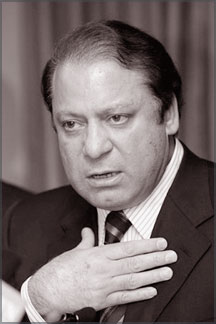Why Pakistani ex-PM was deported
by M Ilyas Khan
By deporting former premier Nawaz Sharif to Saudi Arabia hours after
he landed in Pakistan, the country's military-led government has made a
difficult choice.
It has opted for a confrontation with the Supreme Court instead of
allowing Mr Sharif, an unpredictable rival, to set Pakistan's political
agenda ahead of elections due later this year.

But will this choice make life easier for Gen Pervez Musharraf, the
embattled president of the country?
The Supreme Court ruled in July that Mr Sharif could return to the
country, ending a seven-year-long exile.
His deportation to Saudi Arabia on Monday, say legal experts,
breaches that verdict and constitutes contempt of court.
So what was the government thinking when it decided to exercise this
option? Perhaps the answer lies in the choices Gen Musharraf faces
during the next couple of months
Eight years after he toppled Mr Sharif's government in a dramatic
coup, Gen Musharraf has lost much of his earlier glow.
Losing battle
For more than a year, he has been struggling to contain growing
public unrest and an increasingly independent judiciary.
He has been fighting a losing battle against Islamic militants and
ethnic Baloch nationalists in the north and west of the country.
Last March, by suspending the country's chief justice he
inadvertently sparked a countrywide protest movement by lawyers, civil
society groups and the opposition parties.
His moral standing suffered a major setback when the Supreme Court,
in a popular move, reinstated the chief justice in July.
All these troubles have come just two months before Gen Musharraf's
term as president expires.
Backfire
His term as the army chief technically expired in August 2003 when he
reached retirement age, but a special act of parliament allowed him to
carry on as both president and army chief until 15 November 2007.
He has been exploring different options to retain both offices for
another term, but none of them are likely to stand up in a court of law.
Another parliamentary exemption may help, and it has been offered to
him by the PPP, the largest party in the country. But it wants him to
give up his army post and settle for reduced presidential powers.
Alternatively, he could order his intelligence agencies to try to
ensure a parliamentary victory for his PML-Q party loyalists by rigging
the elections. But that could backfire, given the increasing influence
and confidence of the electronic media in Pakistan.
Given these tough choices, many in the government were afraid that an
anti-Musharraf campaign by Mr Sharif would upset the delicate balancing
act Gen Musharraf has to perform to survive in office.
Temptation
When Mr Sharif decided to return to the country, one option was to
arrest him in connection with some of the corruption cases still pending
against him, and put him in jail.
But his continued presence in the country might well have caused the
political temperature to rise, especially in the wake of a renewed
campaign by the country's lawyers to stop Gen Musharraf from running for
another term.
It might also have tempted the PPP to either toughen its demands in
its negotiations with the government, or to pull out of the talks
altogether, given that PPP leader Benazir Bhutto has been coming in for
criticism for trying to reach a deal with the military-led government.
It was therefore imperative, from the point of view of the
government, to prevent Mr Sharif from returning and staying on in the
country.
And exile in Saudi Arabia was the best option.
Fraught
In December 2000, Mr Sharif was granted a presidential pardon in two
criminal convictions and exiled to Saudi Arabia.
The Pakistani and Saudi governments say that as a quid pro quo, he
promised not to return to Pakistan or interfere in its politics for 10
years.
His latest deportation to Saudi Arabia means that he could be out of
the picture for another three years.
But observers believe the move itself is fraught with several risks.
For one, the government risks a backlash from the lawyers and the
opposition groups who view Mr Sharif's deportation as an illegal move.
The Supreme Court, which owes its newfound freedom to the lawyers'
movement for the restoration of the rule of law, will be under pressure
to hold the government accountable.
A petition against Mr Sharif's deportation has already been filed by
his PML-N party. If the Supreme Court rules in favour of Mr Sharif it
will be another blow to the government's credibility.
It would also make it harder for the PPP to continue to negotiate
power sharing with a government that is seen to have openly violated the
basic rights of a popular leader.
BBC |
